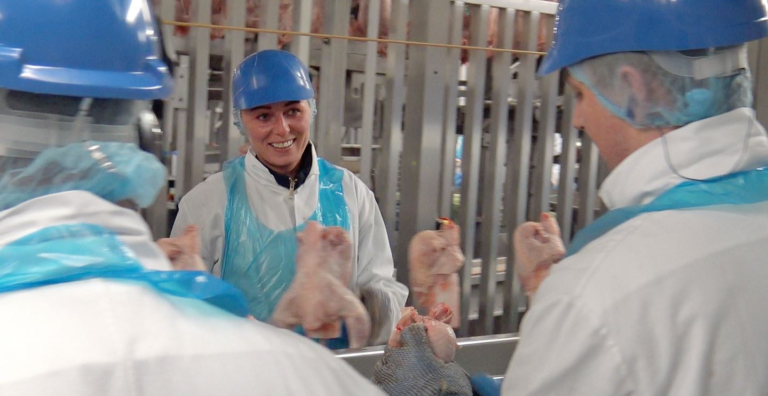The Government’s plan to introduce mandatory CCTV in all slaughterhouses in England is a huge win for animal health and welfare, following years of campaigning by the British Veterinary Association (BVA) and Veterinary Public Health Association (VPHA).
BVA and VPHA – who represent the Official Veterinarians (OVs) who oversee animal health and welfare and public health in slaughterhouses – have been campaigning for both mandatory CCTV in all areas of slaughterhouses where live animals are kept and full and unrestricted 24/7 access to CCTV footage for OVs as part of their long-standing welfare at slaughter campaign. Both commitments are vital in order to safeguard animal welfare, assist with enforcement and instil consumer confidence. All of these asks were included under new animal welfare plans announced today by Environment Secretary Michael Gove.
British Veterinary Association President Gudrun Ravetz said: “Today’s announcement is extremely welcome. We have been campaigning on this issue for a number of years and this announcement represents a huge win for animal health and welfare in England. Mandatory CCTV in all areas of slaughterhouses will provide an essential tool in fostering a culture of compassion that could help safeguard animal welfare and we are particularly pleased to see a commitment to Official Veterinarians having unrestricted access to footage. Vets’ independence and unique qualifications help ensure that the UK will continue to have the highest standards of animal health, welfare and food safety.
“We recognise that the cost of installing CCTV may be a burden for some very small abattoirs, but it is important that the animals we farm for food have both a good life and a humane death and CCTV has a key role to play in ensuring these requirements are met.”
Under the current law OVs have a right to request and to see the footage if they have cause for concern that abuse may be occurring. However, if this needs to be enforced though the courts the process can be protracted. Both BVA and VPHA have repeatedly voiced concerns that the purpose of CCTV in slaughterhouses is fundamentally undermined if vets are refused access to footage and the footage is not monitored independently of the slaughterhouse business operator.
Veterinary Public Health Association President Lewis Grant said: “This represents a unique opportunity for Food Business Operators to work together with their OVs to ensure that they operate under the highest standards of animal welfare at all times and that any staff training issues can be assessed and addressed by viewing appropriate footage. We are encouraged to see that it applies to all premises great and small and allows unrestricted access ensuring that this is a workable and viable tool for the OV.
“I feel that our OVs will universally approve these new proposals that should ensure this country remains a world leader in promoting the highest standards of animal welfare.”
In the announcement, the Government has also confirmed it will update the animal welfare codes – guidance which sets the standards farmers and keepers have to meet under animal welfare legislation. The first code to be updated focuses on welfare standards for chickens bred for meat.
Gudrun Ravetz added: “We welcome the consultation to update welfare codes for farmed animals and pets, many of which are in urgent need of updating to reflect the latest animal welfare science and good practice. We are keen to see Defra working with the veterinary profession, industry and all relevant stakeholders to ensure vital welfare codes are brought up to date.”
John Tasker of the British Veterinary Poultry Association said: “BVPA are committed to supporting research and implementation of best practice in all aspects of poultry production, including welfare on farm and in the abattoir. We look forward to cooperating fully with Defra in development and implementation of these new initiatives. The British poultry industry has some of the highest welfare standards in the world and seeks to continually update and refine its practices in the light of new research, and to maintain public confidence in the industry.”
All of the new proposals will be subject to consultation and BVA, VPHA and BVPA will be considering the detailed plans before submitting their full response to Defra.
With the proposals applying to slaughterhouses in England only, BVA and VPHA will continue to lobby other UK governments to introduce legislation on CCTV in all slaughterhouses that guarantees full and unrestricted access to footage for OVs.
Defra’s proposals and the consultation on CCTV in slaughterhousesremains open for six weeks.
The consultation on the Code of Practice for the Welfare of Meat Chickens and Meat Breeding Chickens remains open for eight weeks


